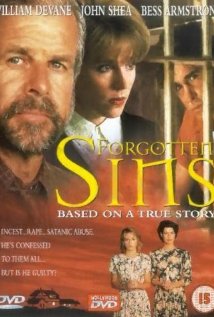
FORGOTTEN SINS
US, 1996, 100 minutes, Colour.
William Devane, John Shea, Bess Armstrong, Dean Norris, Gary Grubbs, Ray Mc Kinnon.
Directed by Dick Lowry.
Forgotten Sins is an American telemovie, coming out at the end of the 20th century, focusing on a very serious issue, sexual abuse, cover-ups – but it also treats of the issue of repressed memories and false memories.
An interesting film about incest is the telemovie, Something About Amelia with Ted Danson. Also interesting is the television film about false memories and their recovery, Indictment: the Mc Martin Trial.
This film is surprising in so far as it concerns the very serious-minded Sheriff, played by John Shea, his home life with his wife, Bess Armstrong, and his attitude towards his two daughters, something of an awkward personality, not strong on emotion and personal touch. The film shows the participation of the whole family in a local revivalist church, with a strong influence of sermons and advice of the pastor, Gary Grubbs.
At a youth camp, the older daughter confides in a counsellor that she has been abused by her father and by his card-playing friends. She is immediately believed and she and her sister are withdrawn from the family. The girls continue their accusations, elaborating them more and more, even bringing in Satanist connections and accusing the card-players of this Satanism.
A psychologist, William Devane, is brought in, who has interviews with everyone and comes to the conclusion that the girls are lying and that their memories of false and over-elaborated.
The main thrust in point of interest to this film is the fact that the upright sheriff continually condemns himself, sees himself as inadequate in his love for his family, and with the Bible background, believes that he has repressed his memories of the abuse of his daughters.
While the treatment is for a popular television audience, it offers themes in characters well worth discussing.
1. The 20th century story, sexual abuse, within families, public consequences, the accusations against a respectable citizen? Lies and false memories? Suppressed memories and their recovery?
2. The American city setting, the family, the religious beliefs and practice, revivalist religion, Biblical texts and quotations, moral stances? The commitment of the parents to their religious beliefs?
3. The title, the emphases, the nature of the sins, the reality that the sheriff thought he had repressed the memories, forgotten them?
4. The portrait of the family, Matthew, father, his work as the sheriff, with the rest of the men, his application of the law? His religious beliefs and church presence? His cold personality? Relationship with his wife? Strict with his daughters, their going to the camps, the accusations?
5. The portrait of the daughters, their age, two daughters, at the camp, the older daughter confiding, the nature of her memories, going to the church, being fostered, developing the memories, the interviews with the police? Believing her memories or not? The two sisters separated from their parents? From their mother? The contradictions in their testimony? The elaborating of their memories? More preposterous aspects, accusations, Satanism? The visitors and their playing cards, their being accused of rape?
6. Matthew in himself, his work, religion, his being charged, the interviews? Audiences not anticipating that he would believe the accusations, the religious advice, his belief in God, God recovering the memories, his deserving to go to prison, his time in prison? His wife and her support, her bewilderment?
7. The portrait of the wife, love for her husband, care for her daughters, churchgoing? The friends coming to play cards? The accusations, her disbelief, her doubts? The repercussions of all this on her?
8. The friends, coming to play cards, their reputations, the accusations, the links to Satanism? The effect on the two men? Arrest, in prison, the reactions, bitterness?
9. The police, taking the accusations seriously, their knowledge of Matthew, their opinion of him, his religion, his beliefs? The pressures on him? His succumbing to the pressures, acknowledging his sins, while acknowledging that he had forgotten them, his reliance on God? His time in prison, the scriptures? The interview with the pastor?
10. The pastor, in his church, his sermons, moralising, his behaviour towards the girls, trying to protect them? His visits to Matthew, to his wife?
11. The girls, the counsellor in whom they confided, her discussed, taking them from their home?
12. The girls, away from home, fostering each other’s opinions, contradictions in their testimony, the absurdities and their testimony?
13. Court cases, verdicts?
14. The introduction of the psychologist, his background, his interest in the case, his experience? The discussions with Matthew, the issue of forgotten sins, suppressed memories? His interviews with the wife? With the girls? His quiet manner, realising the contradictions, drawing people out? His testimony of the police? His own views, that the girls were lying?
15. The impact of the drama? In the light of the surfacing of sexual abuse cases at the end of the 20th century? Statistics that so much abuse happened in the homes? And the issues of repressed memories and falls memories?